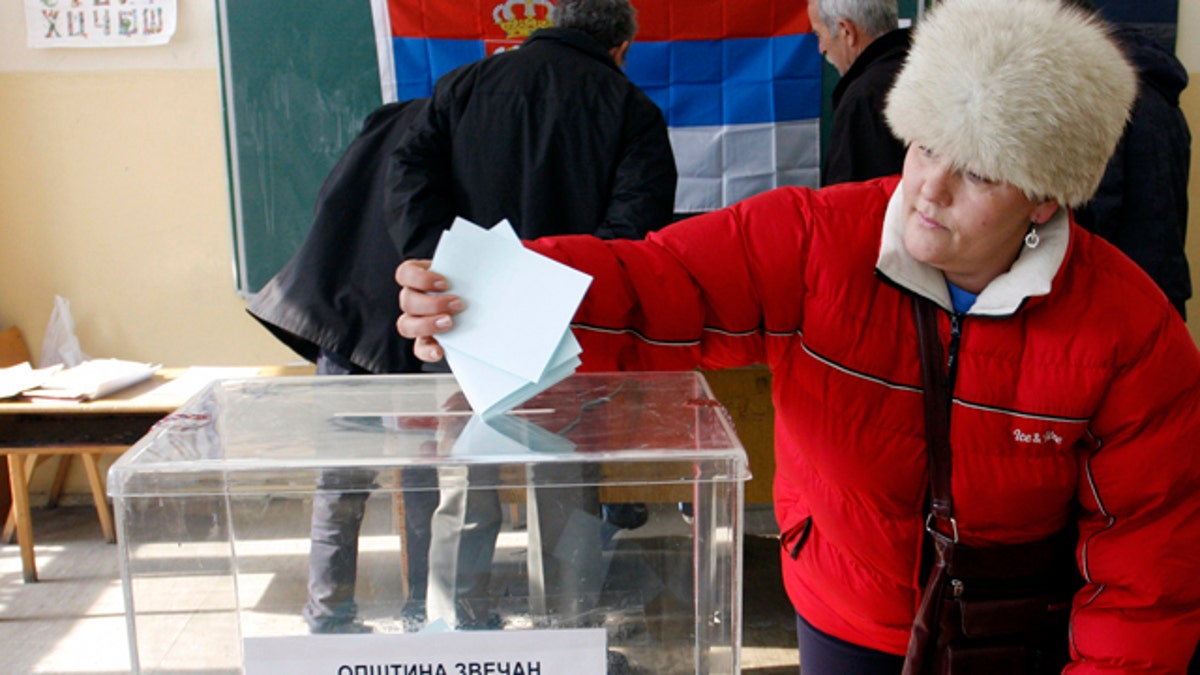
Feb. 14, 2012- A woman casts his ballot at the poilling station in Zvecan, Kosovo. Defiant Serbs in northern Kosovo voted Tuesday in a referendum that is likely to overwhelmingly reject Kosovo's ethnic Albanian rule, further hindering Serbia's attempts to join the European Union. (AP)
MITROVICA, Kosovo -- Serbs in northern Kosovo voted Tuesday in a referendum that is likely to overwhelmingly reject Kosovo's ethnic Albanian rule, further hindering Serbia's attempts to join the European Union.
The EU, and even Serbia -- which does not recognize Kosovo's declaration of independence in 2008 -- have urged the Serbs not to stage the two-day referendum that asks whether they accept Kosovo's government.
Serbs in the tense north last summer set up road blocks to defy the Kosovo government, clashing with NATO peacekeepers.
Germany blocked Serbia's EU candidacy bid after the clashes, demanding that Belgrade dismantle its institutions in Kosovo and urging the Serbs there to integrate into society. Some 40,000 Serbs live in northern Kosovo.
Serbia's President Boris Tadic said the referendum "jeopardizes the interests" of Serbia and further complicates ongoing dialogue with Kosovo's ethnic Albanians as Belgrade tries to make some concessions toward the Pristina government, a precondition for Serbia's path to EU accession.
Serbia's chief Kosovo negotiator Borislav Stefanovic said the holding of the referendum is "meaningless" because its result -- rejection of ethnic Albanian rule -- is certain.
EU officials will review Serbia's bid to formally become a candidate in early March.
Kosovo's government blamed Serbia for setting up the vote that it said was an illegal act aimed at undermining Kosovo's statehood.
"This recent act of Serbia against Kosovo clearly proves the sick ambitions and territorial claims of Serbia towards Kosovo," the statement said.
In Brussels, the EU said it was preparing for a new round of talks between Belgrade and Pristina aimed at easing tensions in northern Kosovo.
"There is a particular situation in the north that needs a solution, but neither violence nor barricades, or a referendum contributes to it," EU spokeswoman Maja Kocijancic said. "Only a dialogue can achieve that."
Kosovo Serb leaders are mostly members of Serbian nationalist parties that want close relations with Russia and are against joining the EU.
They want to split the northern region of Kosovo, which is under their control, and reunify it with Serbia. They see the referendum as a step in that direction.
"Unlike the Kosovo Albanians who are using weapons and violence to reach their goals, the Kosovo Serbs are using peaceful and democratic methods to accomplish theirs," the mayor of the Serb part of the divided city of Mitrovica, Krstimir Pantic, said after casting his ballot.
Senior Serbian government official Oliver Ivanovic criticized the referendum, saying it will have "negative consequences" by further fueling tensions in the region and isolating Kosovo Serbs.
"This is the first time that the Serbs (in Kosovo) have openly disobeyed Serbia," Ivanovic said.
More than 80 countries have so far recognized the independence of Kosovo, including the United States and most EU nations.
